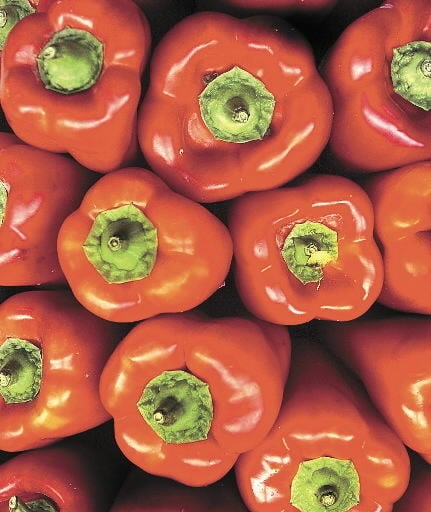
The optimum temperature range for flowering and fruit set on bell peppers, such as those shown here, is between 70 and 80 degrees. Hot peppers tolerate high temperatures much better than bell peppers and often produce fruit in hot weather.
Vegetable plants don't like extremely hot weather any better than people do.
"When it is too hot for us, we go inside to the air conditioning or move into a shady spot in the yard," Richard Hentschel, University of Illinois Extension horticulture educator, said.
"Our vegetables must remain in the sun, so if it is too hot and dry, tomatoes and peppers will abort any unopened flowers until better weather conditions return. This protects the plant from attempting to fulfill a fruit when water is lacking and maintaining itself under better conditions."
Right now, as vegetables move from the general growth stage to producing flowers, fruits and seed pods, a consistent level of soil moisture is critical for health and for harvesting high quality, nutritious fruits and pods.
For example, cucumbers will go from a pollinated flower to a harvestable fruit in about a seven day period, Hentschel said.
"If soil moisture is lacking at any point, you find yourself with cucumbers that appear normal on one end and taper down on the other and can be bitter tasting. If you’re going for a larger, longer cucumber, the fruit may appear fat, then skinny, then fat as the available water has changed."
In extreme heat, snap beans may not fill the bean pod. Lettuce slows its growth and leaves may not have the same expected tenderness. Onion bulbs will stop growing without adequate water and won't resume growth even if water is reintroduced.
These are the water-critical development stages for popular vegetables:
Crucifers (cabbage): head development
Sweet corn: silking, tasseling and ear fill
Cucurbits (gourds, cucumbers, squash, melons): fruit development
Tomatoes and peppers: fruit development
Beans: flowering through pod fill
With our home & garden newsletter!
August 17, 2020 at 07:02AM
https://ift.tt/3kSXeuX
Vegetables need water in extreme heat - Quad City Times
https://ift.tt/2CyIOeE
Vegetable

No comments:
Post a Comment